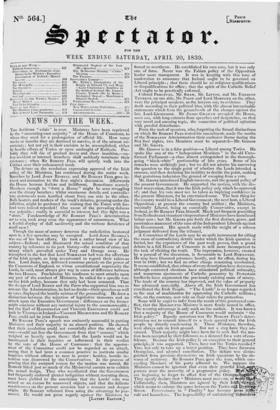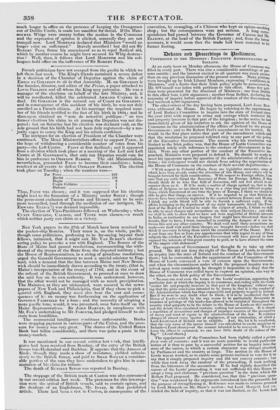NEWS OF THE WEEK.
Ton fictitious " crisis " is over. Ministers have been reprieved by the "measuring-cast majority " of the House of Commons, to whom they sued for a prolongation of official life. How many weeks or months they are destined to survive, is of the utmost un- eertaitity ; but not yet is their excision to be accomplished, either by hostile efforts of Tories or open onslaught of Radicals. Pro- bably they will die of gradual decay and sheer inanition,—un- less accident or internal treachery shall suddenly terminate their existence ; when Sir ROBERT PEEL will quietly walk into the Cabinet over their unhonoured tomb.
The debate on the resolution expressing approval of the Irish policy of the Ministers, has continued during the entire week. Speeches by Lord Joms RUSSELL and Sir ROBERT PEEL gave in-
terest and animation to the first night's discussion. Afterwards the House became listless and indifferent. Sometimes scarcely Members enough to "form a House" might be seen straggling over the dreary benches ; whilst wearisome details and contradic- tory statements were bandied about from one side to the other. Both hearers and readers of the week's debates, groaning under the infliction, might be pardoned for wishing that the Union with Ire- land were indeed repealed! One cause of the pervading dulness was palpable : reality is essential to interest, but this fight was a "sham." Foreknowledge of Sir ROBERT PEEL'S determination not to win, took away even the appearance of earnestness. What a fearful display of dull mediocrity and the verbose flatulence of small men !
Though the mass of oratory deserves the malediction bestowed
upon it, a few speeches may be excepted. Lord JOHN Rt.:sm.:Les was one of his best efforts. He took a rather broad view of his subject—Ireland ; and illustrated the actual condition of that country by reference to its past history—the records of crime and misery which prevailed under Tory and Orange sway. He triumphed in the fact that Lord NORMANDY had won the affections of the Irish people, so long accustomed to regard their rulers as foes. Lord Joux, too, delivered sonorous periods on the power of the Commons of England, to whose constitutional superiority the Lords, he said, must always give way in cases of' difference between the two Houses. Proclaiming his readiness to meet attacks upon any part of' the conduct of Ministers, he called for a specific vote on the Irish policy, because that only had been censured. That the design of Lord RODEN and the Peers who supported him was to censure the Administration, he had no doubt—their speeches as well as votes displayed the hostile animus of the proceeding. He drew a distinction between the rejection of legislative measures and an attack upon the Executive Government : differences on the former might continue without any material injury to the commonwealth ; but the Earl of HADDINGTON and Viscount EBRINGTON could not both be Viceroys in Ireland—Viscount MELBOURNE and Sir ROBERT PEEL could not be joint Premiers.
Sir ROBERT PEEL'S speech was eminently successful in putting Ministers and their majority in an absurd position. He showed that their resolution could not essentially alter the state of the case—would not free the Government from that " censure" which weighed so heavily upon them : that the Lords would not be sum-ruined in their inquiries or influenced in their verdict by the vote of the House of Commons : that the appoint- ment of the Committee could not be regarded as an attack, seeing that it had been a common practice to institute similar inquiries without offence to men in power : besides, hostile in- tention was disavowed by the Conservatives. In the process of proving that the assigned reason for the motion was unreal, Sir ROBERT lifted just so much of the Ministerial curtain as to exhibit the actual design. They who recollected that the Government had frequently endured greater indignities without resenting them, must have yielded to the conviction that the Lords' vote was seized as an excuse for unavowed objects, and that the delicate sensitiveness on the present occasion had a remoter and deeper Sir Ronmtr refrained from using the advantage he pos- sessed. He would not press eagerly against the Ministers he
[L/in:8T EDITION.]
feared to overthrow. He established his own case, but it was only one of form. Never was the Fabian policy of the Opposition leader more transparent. It was in keeping with this tone of moderation to announce that Ireland ought to be governed on Liberal principles ; that there should be no religious qualifications or disqualifications for office; that the spirit of the Catholic Relief Act ought to be practically enforced.
Colonel PERCEVAL, Mr. SHAW, Mr. LITTON, and Mr. EMERSON TENNENT, on one side, Mr. PICOT and Lord .MORPETII on the other,
were the principal speakers, as the lawyers say, to evidence. They dealt according to their political bias, with the almost interminable statements which form the groundwork of the charges against the
late Lord-Lieutenant. Sir JAMES GRAIIAM occupied the House, more silo, with long extracts from speeches and despatches, on that very novel and amusing topic, the connexion of political agitation with prandial disturbance.
From the mob of spoutcrs, who, forgetting the formal distinctions on which Sir ROBERT PEEL rested his amendment, made the merits
of the NORMANDY Administration their exclusive theme during the first four nights, two Members must be separated—Mr. Ginsox and Mr. GROTE.
Mr. GIBSON is in a false position—a Liberal among Tories. He spoke like one of the " Independent Members" in the old Unre- formed Parliament—a class almost extinguished in the thorough- going " black-white" partisanship of late years. Some or his remarks were strikingly just ; but we did not admire his narrowing the question to the single point of whether the Lords intended a censure, and then declaring his inability to decide the point, snaking that gratuitous indecision the ground of escaping from a vote.
Mr. GROTE. introduced English interests, and the general policy of the present Government. He supported the motion, with the dis-
tinct reservation, that it was the Irish policy only which he approved of; and that his vote must not be taken as implying confidence in the present Ministers, for he entertained none. The best thing for the country would be a Liberal Government; the next best, a Liberal Opposition : at present the country had neither ; the Ministers, nominally Liberal, being as essentially Conservative, except in Ireland, as Sir ROBERT PEEL himself. Much and frequent grumbling
from Radicals and abundant vituperation of -Ili sisters have been heard before now ; but Mr. GROTE put forth the first distinct, grave, and
passionless statement of the case of the Independent Liberals against the Government. His speech reads with the weight of' a solemn judgment delivered from the tribunal. A Committee of the Lords may be an unfit instrument for sifting the mass of contradictory details under which the Irish question ms buried, but the experience of the past week proves, that a grand debate in a full House of Commons is still more incompetent to the task of eliciting the truth. The impression, however, created by a perusal of the discussion, is favourable to Lord Noptimsnv. He may have liberated prisoners hastily, and for effect, during his tour in 1836 ; but we find no other charge remaining unrebutted.
It seems established, that crimes of every description have decreased; although contested elections have stimulated political animosity, and numerous ejectments of Catholic peasantry by Protestant landlords have augmented the previously existing mass of misery. The trade of the country has improved, and the value of property has advanced materially. Above all, the Irish Government has conciliated the Irish People. " The Castle" is no longer regarded as the seat of machination for oppressing the Catholic millions ; who, on the contrary, now rely on their rulers for protection.
Some will be eager to infer from the result of this protracted con- flict, that the MELBOURNE Ministry is more firmly seated in office.
The seeming advantage is only such on the surface. It was known that a majority of the House of Commons would maintain " the
Irish policy.' Equally notorious was Sir ROBERT PEar.'s deter-
mination not to commit himself to a fresh quarrel with the Irish people by directly condemning it. These Ministers, therefore, were always safe on Irish ground. But not a step have they ad- vanced. Their majority might have been tar to seek had the mo- tion been accepted by their followers as a demand for a vote of con- fidence. Because the Irish policy is an exception to their general principle, it was supported. Then, have not the Tories recoiled ? Yes; but only to take up a better position. They have forsworn Orangeism, and adopted conciliation. The debate was distin- guished from previous discussions on Irish questions by the ab- sence of acrimony. Sir Roman. PEEL gave the tone, which suc- ceeding Members of his party adhered to. We suppose the
Ministers cannot be ignorant that even their grateful Iris porters avow the necessity of a progressive policy. 11: are beginning to forget to affect fear of time Orangds, They openly declare that " Ministers must move on, or as Collaterally, then, Ministers arc injured by their Ir00 which seems to enlarge the space between the Tories aryl o1;; Street. Perseverance in " Finality" has become ;tote
cult and hazardous. The impossibility of maintainireflabOavea. • • • •
much longer in office on the pretence of keeping the Orangemen out of Dublin Castle, is made too manifest for denial. If the MEL- BOURNE Whigs were uneasy before the motion in the Commons and the expression of opinion it elicited, assuredly they are not tranquil now. Lord MORPETH declared that Ministers " would no longer exist on sufferance Bravely mouthed ! but did not Sir ROBERT PEEL frame his amendment so as to repel Radical aid, which by another course he might have secured for Whig destruc- tion ? Well, then, it follows that Lord MORPETH and his col- leagues hold office on the sufferance of Sir ROBERT PEEL.



























